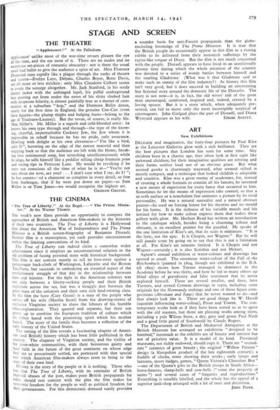THE CINEMA
" The Tree of Liberty." At the Regal.--,. The Prime Minis- ter." At the Warner Theatre.
THE week's new films provide an opportunity to compare the approaches of British and American film-makers to the histories of their two countries. The Tree of Liberty is a Hollywood film about the American War of Independence and The Prime Minister is a British screen-biography of Benjamin Disraeli. Neither film is a masterpiece, yet each provides entertainment within the limiting conventions of its kind.
The Tree of Liberty can indeed claim a somewhat wider achievement since it employs an unconventional solution to the old problem of fusing personal story with historical background. This film is not content merely to tell its love-story against a picturesque back-cloth of Washington, Lafayette and the Boston Tea-Party, but succeeds in embodying an essential aspect of the revolutionary struggle of that day in the relationship between hero and heroine. For the fight in the American colonies was not only between a liberty-seeking people and their British exploiters across the sea, but was a struggle also between the great mass of the colonists and their own rich land-owning class. In the film the hero (Cary Grant) is a man of the people who carries off his wife (Martha Scott) from the drawing-rooms of exclusive Virginian society to share the labours of his humble tobacco-plantation. They quarrel and separate, but their son grows up to combine the European tradition of culture which his father hated with the pioneering spirit which his mother feared. The story of the family thus becomes a reflection of the early history of the United States. The setting of the film reveals a fascinating chapter of Ameri- can (and British) history which has been little publicised in this country. The elegance of Virginian society, and the virility of the poor-white communities, with their boisterous gaiety and their faith in the future of the great continent on whose edge they are so precariously settled, are portrayed with that special zest which American film-makers always seem to bring to the story of their own land.
History is the story of the people or it is nothing. Those who fear that The Tree of Liberty, with its reminder of British imperial abuses of the past, makes poor British propaganda for today should rest content with the plea the film makes for economic freedom for the people as well as political freedom for their governments. For this democratic demand surely provides a sounder basis for anti-Fascist propaganda than the globe- encircling boomings of The Prime Minister. It is true that the British people do occasionally appear in this film as a rioting rabble to be delivered from their moronish sufferings by the rapier-like tongue of Dizzy. But the film is not much concerned with the people. Disraeli appears to have lived in an unrelievedly gloomy time during which the whole attention of the country was devoted to a series of wordy battles between himself and the snarling Gladstone. (What was it that Gladstone said to make such an enemy of the film industry?) As history this film isn't very good, but it does succeed in building an entertaining but fictional story around the domestic life of the Disraelis. The story is not new—it is, in fact, the old wives' tale of the great man encouraged, comforted, inspired and, indeed, created by a loving spouse. But it is a story which, when adequately pre- sented, can fail to move only the most incorrigibly sceptical of cinemagoers. John Gielgud plays the part of Disraeli, and Diana






























 Previous page
Previous page